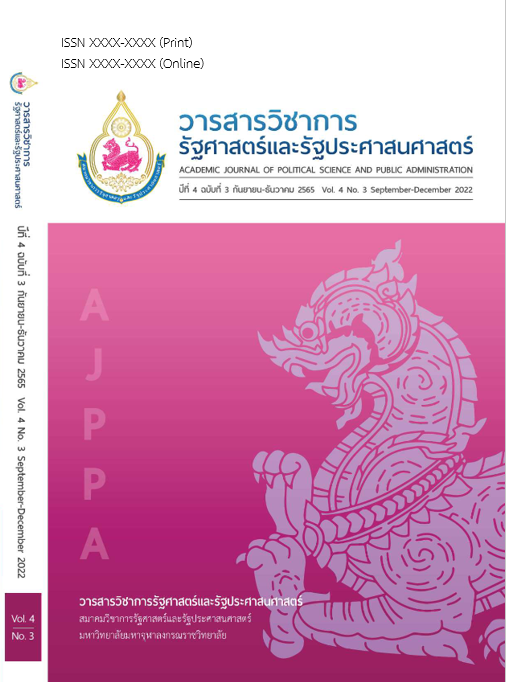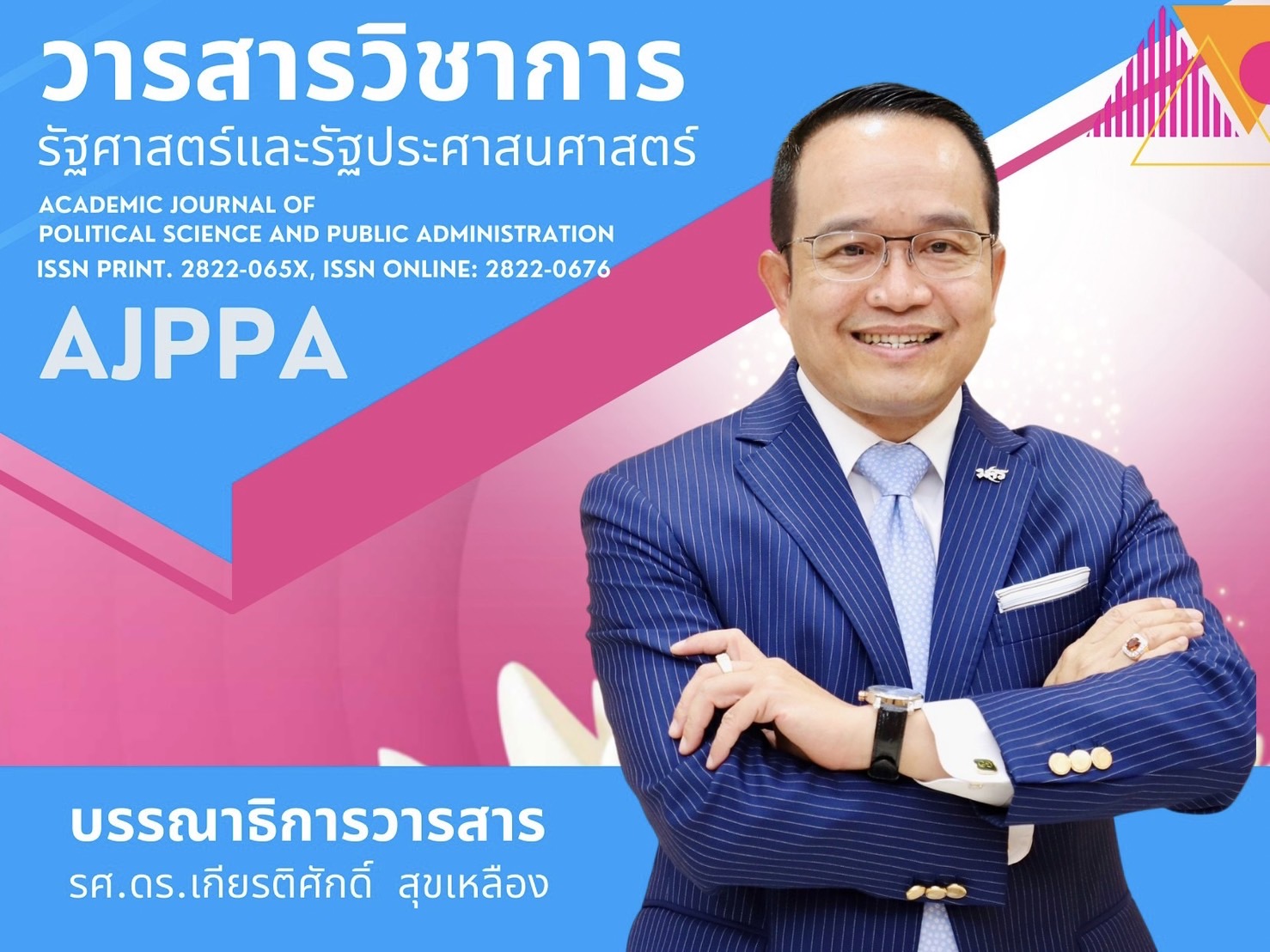ปัจจัยที่ส่งผลต่อสมรรถนะเพื่อการเรียนรู้เทคโนโลยีดิจิทัล ของบุคลากรศาลปกครอง
คำสำคัญ:
ปัจจัยที่ส่งผล, สมรรถนะเพื่อการเรียนรู้, เทคโนโลยีดิจิทัลบทคัดย่อ
บทความวิจัยนี้มีวัตถุประสงค์เพื่อศึกษาปัจจัยที่ส่งผลต่อสมรรถนะเพื่อการเรียนรู้เทคโนโลยีดิจิทัลของบุคลากรศาลปกครอง โดยเป็นการวิจัยเชิงปริมาณ กลุ่มตัวอย่างเป็นบุคลากรศาลปกครอง จำนวน 338 คน เครื่องมือที่ใช้ในการเก็บรวบรวมข้อมูลเป็นแบบสอบถาม ซึ่งมีค่าความเชื่อมั่นทั้งฉบับเท่ากับ 0.966 โดยการวิเคราะห์การถดถอยพหุคูณ (Multiple Regression Analysis) แบบขั้นตอน (Stepwise Multiple Regression)
ผลการวิจัยพบว่า ปัจจัยที่ส่งผลต่อสมรรถนะเพื่อการเรียนรู้เทคโนโลยีดิจิทัลของบุคลากรพบว่า 1) องค์ประกอบสมรรถนะที่ส่งผลต่อการพัฒนาสมรรถนะเพื่อการเรียนรู้เทคโนโลยีดิจิทัลของบุคลากรศาลปกครอง มี 3 ด้าน ด้านมโนทัศน์เกี่ยวกับตนเอง ด้านคุณสมบัติส่วนตัว และด้านแรงจูงใจ อย่างมีนัยสำคัญทางสถิติที่ระดับ 0.01 แสดงว่าองค์ประกอบสมรรถนะสามารถร่วมกันทำนายการพัฒนาสมรรถนะเพื่อการเรียนรู้เทคโนโลยีดิจิทัลของบุคลากรศาลปกครองได้ร้อยละ 32.8 และเมื่อพิจารณาเป็นรายด้านพบว่า คุณสมบัติส่วนตัว สามารถทำนายได้ร้อยละ 43.3 รองลงมาคือ แรงจูงใจ สามารถทำนายได้ร้อยละ 14.4 และมโนทัศน์เกี่ยวกับตนเอง สามารถทำนายได้ร้อยละ 5.5 ตามลำดับ 2) หลักปัญญา 3 ที่ส่งผลต่อการพัฒนาสมรรถนะเพื่อการเรียนรู้เทคโนโลยีดิจิทัลของบุคลากรศาลปกครอง มี 3 ด้าน ด้านสุตมยปัญญา (การเรียนรู้) ด้านจินตามยปัญญา (การทบทวน) และด้านภาวนามยปัญญา (การปฏิบัติ) อย่างมีนัยสำคัญทางสถิติที่ระดับ 0.01 แสดงว่าหลักปัญญา 3 สามารถร่วมกันทำนายการพัฒนาสมรรถนะเพื่อการเรียนรู้เทคโนโลยีดิจิทัลของบุคลากรศาลปกครองได้ร้อยละ 51.1 และเมื่อพิจารณาเป็นรายด้าน พบว่า ภาวนามยปัญญา (การปฏิบัติ) สามารถทำนายได้ร้อยละ 62.2 รองลงมาคือ สุตมยปัญญา (การเรียนรู้) สามารถทำนายได้ร้อยละ 6.6 และจินตามยปัญญา (การทบทวน) สามารถทำนายได้ร้อยละ 6.2 ตามลำดับ
เอกสารอ้างอิง
ทัศมาวดี ฉากภาพ. (2564). โมเดลความสัมพันธ์เชิงสาเหตุการพัฒนาสุขภาวะผู้สูงอายุขององค์กรปกครองส่วนท้องถิ่นในจังหวัดพระนครศรีอยุธยา (ดุษฎีนิพนธ์ปรัชญาดุษฎีบัณฑิต สาขาวิชารัฐประศาสนศาสตร์). พระนครศรีอยุธยา: มหาวิทยาลัยมหาจุฬาลงกรณราชวิทยาลัย.
พระมหาเทวประภาส วชิรญาณเมธี. (2559). พุทธบูรณาการเพื่อการพัฒนาสมรรถนะองค์การบริหารส่วนตำบลในการเสริมสร้างชุมชนเข้มแข็ง (ดุษฎีนิพนธ์พุทธศาสตรดุษฎีบัณฑิต สาขาวิชารัฐประศาสนศาสตร์). พระนครศรีอยุธยา: มหาวิทยาลัยมหาจุฬาลงกรณราชวิทยาลัย.
ยุทธ ไกยวรรณ์. (2556). การวิเคราะห์สถิติหลายตัวแปรสำหรับงานวิจัย. กรุงเทพฯ: โรงพิมพ์จุฬาลงกรณ์มหาวิทยาลัย.
วิรงรอง ช้างเนียม. (2564). สมรรถนะของครูสังคมศึกษาที่ส่งเสริมคุณลักษณะการอยู่อย่างพอเพียงของนักเรียนในโรงเรียนมัธยมศึกษาจังหวัดพิษณุโลก. วารสาร มจร สังคมศาสตร์ปริทรรศน์, 10(2), 126-135.
ศาลปกครอง. (2563). แผนแม่บทศาลปกครอง ระยะ 20 ปี (พ.ศ. 2560 – 2580). สืบค้น 22 ธันวาคม 2563, จาก http://admincourt.go.th/admincourt/upload/
webcms/Court/Court_310120_145858.pdf
สมบัติ นามบุรี. (2562). โมเดลความสัมพันธ์เชิงสาเหตุแบบพุทธบูรณาการของภาวะผู้นำการเปลี่ยนแปลงในศตวรรษที่ 21 ของผู้บริหารการท่องเที่ยวแห่งประเทศไทย (ดุษฎีนิพนธ์ปรัชญาดุษฎีบัณฑิต สาขาวิชารัฐประศาสนศาสตร์). พระนครศรีอยุธยา : มหาวิทยาลัยมหาจุฬาลงกรณราชวิทยาลัย.
สำนักงาน ก.พ. (2561). ทักษะด้านดิจิทัลของข้าราชการและบุคลากรภาครัฐเพื่อการปรับเปลี่ยนเป็นรัฐบาลดิจิทัล ตาม (ว6/2561). สืบค้น 22 ธันวาคม 2563, จาก https://www.ocsc.go.th/digital_skills2
สำนักงานศาลปกครอง. (2556). อัตรากำลังในภาพรวมของสำนักงานศาลปกครอง. กรุงเทพฯ: สำนักงานศาลปกครอง.
Cronbach, L. J. (1971). Aptitudes and Instructional Methods A Handbook for Research on Interactions. New York: Wiley & Sons.
Yamane, T. (1967). Statistics: an Introductory Analysis (2nd ed.). New York: Harper and Row.

ดาวน์โหลด
เผยแพร่แล้ว
รูปแบบการอ้างอิง
ฉบับ
ประเภทบทความ
สัญญาอนุญาต

อนุญาตภายใต้เงื่อนไข Creative Commons Attribution-NonCommercial-NoDerivatives 4.0 International License.




